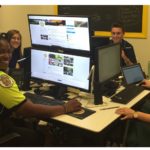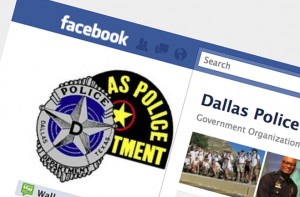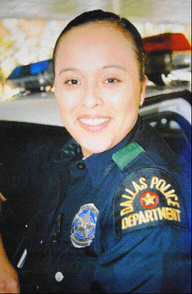Welcome to the the next installment in my series of social media tips. These are aimed primarily at a police audience, but hopefully applicable to a wider group of people too, especially those in the public sector. This series of posts will aim to identify some good practice and useful hints and tips for police officers and staff to consider when using social media.
Part 4: Ten things to have on your page to drive up interest??

These are the 10 essential things (plus a bonus 11th tip) that you should have on your Facebook Page, or use in your Twitter feed if you want to drive up interest in your posts in a positive way that promotes the policing message you want to get across. Of course there are other ways of getting lots of interest in your posts, but I suggest that you don’t want to aim for scandal, legal actions or nudity in order to make your point!
At number 10 is events and engagements. Post up what is happening, and where, and allow some conversation to develop around events if possible. You should promote your own events, and community events even if these are very local (and perhaps it is more important if they are) Promote your activities in the local area, e.g., targeted foot patrols, meetings, and crime reduction events. This should be updated regularly with anything you are involved with that people will be interested in.
Number 9 is an obvious one, but one often overlooked. Make sure that somewhere on your page, or bio, are full contact details – phone email etc. If there is insufficient space on a Twitter bio (curse those 140 character limits), then link to your details on the force website. And while you are doing that, check that the force website, crime mapper etc have your Facebook, Twitter and any other relevant websites listed as well.
Number 8 is particularly relevant for neighbourhood teams, but can also be used for follow up on investigations and around public order accounts as well. An opportunity for people to propose and vote on priorities is a useful tool – it widens the consultation with the public on how they want to be policed, and offers an opportunity to invite local people to get more involved – informally by attending meetings, semi-formally by initiatives such as community speedwatch, and formally through volunteering or the special constabulary.
At number 7 are appeals – wanted persons / missing people / requests for intelligence etc. For time limited content like this is is probably better to link back to your main force site so this content is up to date. If the missing person is found for example, you may not want your Facebook page to still be reporting them missing 2 months later…
Number 6 – think about extending your reach. Social media is a great way of having a conversation, but why not consider a blog? The best policing blogs are ‘day in the life’ prose created by any individual officer or member of staff to aid the public to better understand the police and the different roles in the policing service. In general they should be interesting, concise, informative accounts with positive information, and have a personalised manner – giving the reader an insight of being with the officer in question. And just because you are not a police officer don’t think that the public are uninterested in what you have to say – PCSOs, call takers, and other support staff have interesting roles too. I am still waiting for the first police finance blog, but you never know…
A couple of good blogs to start with include DCC Stuart Hyde from Cumbria, or for a blog targetted at a specific operation look at OpNova, where a student from Lincoln University blogged about going out in the city for a month without drinking, and her experience of being on patrol with the police and seeing the effects of drink on people.
Number 5 The best sites provide useful links to other sites – both local sites of interest and partners. Don’t be afraid of passing your visitors through to another website – both people and internet search engines like pages that link to other pages more than those that sit in isolation. On Twitter this is best done with a link to a topical page on a partners site – an event of press release for example. The sorts of sites that you can link to are Neighbourhood Watch, Crimestoppers, Partners such as your county, borough, town and district councils, Ringmaster, Police force Website(s), Immobilise.com…
Number 4 Pictures and videos – link from your main force website, or commission some basic ones yourself. Even mobile phone footage is good enough. Training and warrant execution videos give the public something back from the police. It allows them into places they would not normally get access. Snippets from behind the scenes gives an insight into all the training and hard work we do. Event videos allow our customers to see what activities we are getting involved with in the local area – attending the local youth club, diversionary activity or local summer fair for example. Use of video and photographs will make you and the force more approachable and more human. Check out this example from the Carholme NPT in my own force.
And the top 3…
Number 3 Start running online surgeries, or Q&A sessions – start small and keep going with them for a few months at least to build interest. Again this is often seen as just relevant to neighbourhood teams, but can also be used around specialist subjects such as roads policing, recruitment or firearms. You can use existing pages on Facebook, Twitter etc, but you may find it easier to use something that stores the content for people to refer back to, and allows pre-moderation of questions if desired (check out coveritlive.com for example).
Number 2 be very clear about how the content you post on your social media channel reflects force and local priorities, and explain what we along with our partners are doing to address local issues affecting local communities. Provide links to operations and success stories that are of interest and relevance to your readers.
And at number one, my very top tip for police use of social media – Make sure your page or status is regularly updated. ‘Regularly’ might mean hourly, daily weekly or even monthly, but if people expect to check back and find new content and don’t, they will stop checking back.
I know this was a top ten, but as a bonus tip, you may also want to consider putting up some FAQs (Frequently Asked Questions) to address some of the common questions you will be asked.
Think I have missed something? Have a different set of things you feel police users of social media should focus on? Post up a comment here.
Top 10 image credit sam_churchill on Flick’r
This post was previously published on Partrdigej’s blog.
Previous posts from the Social Media Handbook Series:
Part 1: What Social Media networks should I use?
Part 2: How do I get followers / friends ???
Part 3: Policies / Strategies / Guidance??

Justin Partridge
Justin Partridge is a senior manager for Lincolnshire Police in England. He also works on Local Policing and Partnerships for the Association of Chief Police Officers (ACPO).
Justin Partridge has worked in the public sector since leaving university, and for the police since 2003. After being one of only three non-sworn staff selected for the prestigious Police Strategic Command Course (for those who aspire to the most senior posts in UK policing), he started working on the national Local Policing and Partnerships area with chief officers from across the UK, and with partners from the Home Office, NPIA, APA and elsewhere.
Justin is passionate about making a difference to people, and see social media and new technologies having a major role in this – especially in policing and the wider public sector. He blogs on a variety of issues, predominantly around police and technology, and can be found on Twitter talking about much the same.
 Everyone makes mistakes. Mistakes are a part of life, and can be valuable lessons for how to do things better next time. There is often a concern that mistakes on social media sites are somehow worse, somehow bigger than mistakes in the ‘real’ world. Yes there is the potential for mistakes to be copied and pasted around the world, or easily picked up by the media…but this is becoming increasingly true in the real world as well, with mobile phone video cameras, hidden recorders etc.
Everyone makes mistakes. Mistakes are a part of life, and can be valuable lessons for how to do things better next time. There is often a concern that mistakes on social media sites are somehow worse, somehow bigger than mistakes in the ‘real’ world. Yes there is the potential for mistakes to be copied and pasted around the world, or easily picked up by the media…but this is becoming increasingly true in the real world as well, with mobile phone video cameras, hidden recorders etc.









